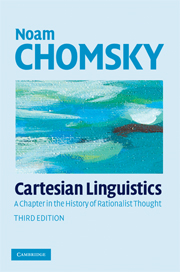Deep and surface structure
Published online by Cambridge University Press: 25 January 2011
Summary
We have observed that the study of the creative aspect of language use develops from the assumption that linguistic and mental processes are virtually identical, language providing the primary means for free expression of thought and feeling, as well as for the functioning of the creative imagination. Similarly, much of the substantive discussion of grammar, throughout the development of what we have been calling “Cartesian linguistics,” derives from this assumption. The Port-Royal Grammar, for example, begins the discussion of syntax with the observation that there are “three operations of our minds: conceiving, judging, and reasoning” (p. 27), of which the third is irrelevant to grammar (it is taken up in the Port-Royal Logic, which appeared two years later, in 1662). From the manner in which concepts are combined in judgments, the Grammar deduces what it takes to be the general form of any possible grammar, and it proceeds to elaborate this universal underlying structure from a consideration of “the natural manner in which we express our thoughts” (p. 30). Most subsequent attempts to develop a schema of universal grammar proceed along the same lines.
James Harris's Hermes, which does not bear the imprint of the Port-Royal Grammar to the extent usual in eighteenth-century work, also reasons from the structure of mental processes to the structure of language, but in a somewhat different way. In general, he maintains, when a man speaks, “his Speech or Discourse is a publishing of some Energie or Motion of his soul” (p. 223).
Information
- Type
- Chapter
- Information
- Cartesian LinguisticsA Chapter in the History of Rationalist Thought, pp. 78 - 92Publisher: Cambridge University PressPrint publication year: 2009
Accessibility standard: Unknown
Why this information is here
This section outlines the accessibility features of this content - including support for screen readers, full keyboard navigation and high-contrast display options. This may not be relevant for you.Accessibility Information
- 1
- Cited by
